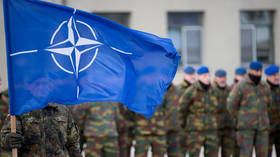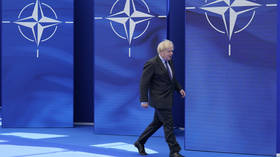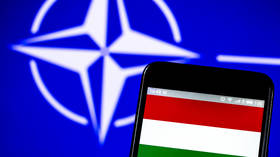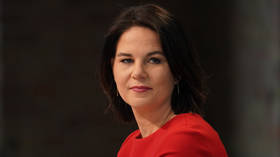Does Russia have a point about NATO expansion?

The current and rapidly escalating tensions between the US and Russia over Ukraine have dominated international headlines and moved stock markets in recent weeks. In reality, they have their roots in a series of NATO actions and omissions following the demise of the Soviet Union in 1989/91. On the Russian side, there is a widespread perception that Moscow was misled by both Washington and NATO, a pervasive malaise about a breach of trust, and a violation of a ‘gentleman’s agreement’ on fundamental issues of national security.
While the US protests that it never gave assurances to Gorbachev that NATO would not expand eastwards, declassified documents prove otherwise. But even in the absence of declassified documents and contemporary statements by political leaders in 1989/91, including Secretary of State James Baker and German Foreign Minister Hans-Dietrich Genscher (which can be confirmed on YouTube), it is all too obvious that there is a festering wound caused by NATO’s eastward expansion over the past 30 years, which has undoubtedly negatively impacted Russia’s sense of security. No country likes to be encircled, and common sense should tell us that maybe we should not be provoking another nuclear power. At the very least, NATO’s provocations are unwise; at worst, they could spell apocalypse.
We in the West play innocent, and retreat into ‘positivism’, asserting that there was no signed treaty commitment, that the assurances were not written in stone. Yet realpolitik tells us that if one side breaks its word or is perceived as having double-crossed the other, if it acts in a manner contrary to the spirit of an agreement and to the overriding principle of good faith (bona fide), there will be political consequences.
It seems, however, that we in the West have become so used to what I would call a ‘culture of cheating’, that we react in a surprised fashion when another country does not simply accept that we cheated them in the past, and that, notwithstanding this breach of trust, they should accept the ‘new normal’ and resume ‘business as usual’ as if nothing had happened. Our leaders in the US, UK and EU contend that they have a clean conscience and refuse to consider the fact that the other side does feel uncomfortable about having been taken for a ride. A rational person, a fortiori a statesman, would pause and try to defuse the ‘misunderstanding’. Yet the US culture of cheating has become so second nature to us that we do not even realise when we are cheating someone else, and we seem incapable of understanding that denying our actions and reneging on our words adds insult to injury.
The culture of cheating is in the family of the doctrine of ‘exceptionalism’. We self-righteously claim the right to cheat others, but do not accept that others can cheat us. Quod licet Iovi non licet bovi (that which Jupiter can do is not permitted for the bovines). This constitutes a kind of predator behaviour that neither religion nor civilisation has succeeded in eradicating. We mount false-flag operations and accuse the other side of the same. The CIA and M15 have been caught red-handed on so many occasions, yet no one seems to be asking whether, in the long run, such conduct is counter-productive, whether our credibility is shot.
Perhaps one explanation for this kind of behaviour is that we have elevated the culture of cheating to a kind of secular virtue – equivalent to cunning, daring and boldness. It is seen as a positive attribute when a leader is ‘craftier’ and ‘sneakier’ than his/her rival. The name of the game is to score points in an atmosphere of perpetual competition where there are no rules. Our geopolitical competitors are just that – rivals – and there is no interest whatsoever in fraternising with adversaries. Co-operation is somehow perceived as ‘weak’, as ‘un-American’. ‘Dirty tricks’ are not seen as dishonest but as clever, even patriotic, because they are intended to advance the economic and political interests of our country. In a way, ‘dirty tricks’ are perceived in a positive light, as artful, ingenious, adventurous, even visionary. This curious approach to reality is facilitated by a compliant and complicit corporate media that does not call our bluff and, instead, disseminates ‘fake news’ and suppresses dissenting views. Unless an individual has the presence of mind to do his/her own research and to access other sources of information, he/she is caught in the propaganda web.
The US government has practised this culture of cheating in its international relations for over 200 years, particularly in its dealings with the First Nations of the continent, who were lied to over and over, and whose lands and resources were shamelessly stolen. As Martin Luther King Jr. wrote in ‘Why We Can’t Wait’, “Our nation was born in genocide”. How many ‘Indian’ treaties were broken, again and again? And when the Sioux, Cree and Navajo protested, we massacred them. See the studies of the United Nations’ Sub-Commission on the Promotion and Protection of Human Rights. This ‘culture of cheating’ is documented countless times in connection with the Monroe Doctrine and US relations with Mexico, Latin America, Hawaii, the Philippines and so on.
One of the elements that is totally missing from the Ukraine debate is the right of self-determination of peoples. Undoubtedly the Russians in Ukraine are not just a minority, but constitute a ‘people’, and, as such, the Russians in Donetsk, Lugansk and Crimea possess the right of self-determination enshrined in the UN Charter and in Article 1 common to the International Covenants on Civil and Political Rights (ICCPR) and on Economic, Social and Cultural Rights. Until the deliberately anti-Russian coup d’état of February 2014, the Ukrainians and Russian-Ukrainians had lived side by side in relative harmony. The Maidan brought with it Russophobic elements that have since been exacerbated by systematic war propaganda and incitement to hatred, both of which are prohibited by Article 20 of the ICCPR. Thus, it is not certain whether the Russians in the Donbass feel safe enough to want to continue living with Ukrainians who have been and are being incited to hate them. Back in March and June 1994, I monitored the parliamentary and presidential elections in Ukraine as a representative of the UN Secretary-General. I travelled around the country. There was no doubt that the Russian speakers had a profound sense of Russian identity.
There would be no conflict in Ukraine today – although both Kiev and Moscow deny an invasion is imminent – if Barack Obama, Under Secretary of State for Political AffairsVictoria Nuland and several European leaders had not destabilised the democratically elected government of Viktor Yanukovich and organised a vulgar coup to install Western puppets. Bottom line: Western interference in the internal affairs of other states can backfire, and the culture of cheating and deceit that we continue to practise renders it impossible to reach sustainable solutions. The UN Charter, the only mandate underpinning the existing ‘rules-based international order’, has the necessary mechanisms to resolve our differences on the basis of the principles of sovereign equality of states and the self-determination of peoples.
The statements, views and opinions expressed in this column are solely those of the author and do not necessarily represent those of RT.















